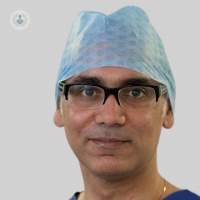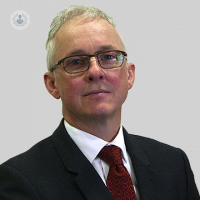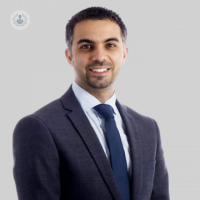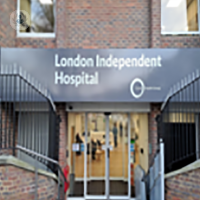What is a vasectomy?
A vasectomy (also known as male sterilisation) is an operation to cut or seal the vas deferens (the tubes that carry sperm out of the testicles), as a form of permanent birth control. The sperm are unable to leave the testicles and therefore do not form part of the man’s ejaculate after the procedure, meaning that he cannot impregnate a female sexual partner.
Vasectomies are usually performed under local anaesthetic. They are over 99% effective as a contraceptive measure. Afterwards, the man is still able to have erections and ejaculate, and his sex drive shouldn’t be affected.

Why is it done?
A man may choose to have a vasectomy when he is certain that he doesn’t want to have any more children in the future. It is an important decision and it is highly recommended that he discuss it thoroughly with his partner before opting for a vasectomy. Vasectomy reversal, while possible, is not always successful, so the patient should be sure that he doesn’t want to father another child.
What does a vasectomy procedure consist of?
A vasectomy is a simple outpatient surgical intervention. The doctor numbs the scrotum with local anaesthetic before operating.
There are two options, which will be discussed between patient and doctor and decided beforehand:
- Conventional vasectomy – the doctor makes two incisions in the skin of the scrotum, through which each tube can be cut, and remove a small section, before either tying them or sealing them shut using heat. The incisions are then stitched up and left to heal.
- No-scalpel vasectomy – a minimally-invasive method, in which the doctor performs the operation through a tiny hole in the side of the scrotum, rather than an open incision. This causes less bleeding and is thought to lead to fewer complications than the conventional method, but requires a doctor with special training to perform.
Vasectomy does have certain risks – the testicles and scrotum are usually bruised and swollen, and some patients suffer ongoing pain. Blood can pool inside the testicles (haematoma) or hard lumps can form due to leaking sperm (sperm granulomas).
Preparation for vasectomy
Before opting for a vasectomy, the matter should be discussed with the patient’s doctor and partner, and in some cases, counselling may be recommended before the decision is made. It is important that the patient understands that there may not be any going back.
As with any surgery, it is important to follow the doctor’s instructions with regards to any medication the patient is taking.
On the day of surgery, it is important to wear loose and comfortable clothes, as well as to clean the scrotum area well.
Care after the intervention
The recovery is usually fast. Many people are able to return to work after a day or two, but it is important to avoid physical exertion or exercise during the first week. As after any other surgery, there is usually some discomfort after the operation.
With regards to sex, it is necessary to continue using contraception for the first 8-12 weeks after the operation to ensure that all remaining sperm have cleared the man’s tubes, but after this there should be no chance of pregnancy.
11-13-2012 06-13-2023Vasectomy
What is a vasectomy?
A vasectomy (also known as male sterilisation) is an operation to cut or seal the vas deferens (the tubes that carry sperm out of the testicles), as a form of permanent birth control. The sperm are unable to leave the testicles and therefore do not form part of the man’s ejaculate after the procedure, meaning that he cannot impregnate a female sexual partner.
Vasectomies are usually performed under local anaesthetic. They are over 99% effective as a contraceptive measure. Afterwards, the man is still able to have erections and ejaculate, and his sex drive shouldn’t be affected.

Why is it done?
A man may choose to have a vasectomy when he is certain that he doesn’t want to have any more children in the future. It is an important decision and it is highly recommended that he discuss it thoroughly with his partner before opting for a vasectomy. Vasectomy reversal, while possible, is not always successful, so the patient should be sure that he doesn’t want to father another child.
What does a vasectomy procedure consist of?
A vasectomy is a simple outpatient surgical intervention. The doctor numbs the scrotum with local anaesthetic before operating.
There are two options, which will be discussed between patient and doctor and decided beforehand:
- Conventional vasectomy – the doctor makes two incisions in the skin of the scrotum, through which each tube can be cut, and remove a small section, before either tying them or sealing them shut using heat. The incisions are then stitched up and left to heal.
- No-scalpel vasectomy – a minimally-invasive method, in which the doctor performs the operation through a tiny hole in the side of the scrotum, rather than an open incision. This causes less bleeding and is thought to lead to fewer complications than the conventional method, but requires a doctor with special training to perform.
Vasectomy does have certain risks – the testicles and scrotum are usually bruised and swollen, and some patients suffer ongoing pain. Blood can pool inside the testicles (haematoma) or hard lumps can form due to leaking sperm (sperm granulomas).
Preparation for vasectomy
Before opting for a vasectomy, the matter should be discussed with the patient’s doctor and partner, and in some cases, counselling may be recommended before the decision is made. It is important that the patient understands that there may not be any going back.
As with any surgery, it is important to follow the doctor’s instructions with regards to any medication the patient is taking.
On the day of surgery, it is important to wear loose and comfortable clothes, as well as to clean the scrotum area well.
Care after the intervention
The recovery is usually fast. Many people are able to return to work after a day or two, but it is important to avoid physical exertion or exercise during the first week. As after any other surgery, there is usually some discomfort after the operation.
With regards to sex, it is necessary to continue using contraception for the first 8-12 weeks after the operation to ensure that all remaining sperm have cleared the man’s tubes, but after this there should be no chance of pregnancy.


Getting ‘the snip’: common questions on vasectomies answered
By Professor Francis Chinegwundoh MBE
2024-11-20
A vasectomy is an effective form of male birth control, rendering a man sterile. It is offered to men who are very certain they don’t want to father (more) children in the future. Professor Francis Chinegwundoh from London, answers some of the most frequently asked questions by men considering undergoing this procedure. See more


How does a vasectomy work?
By Mr Moeketsi Mokete
2024-11-19
Here to shed expert light on how a vasectomy is performed and why it is considered is highly experienced consultant urologist, Mr Moeketsi Mokete. See more


How successful is a vasectomy reversal?
By Mr Rajagopalan Sriram
2024-11-19
A vasectomy reversal is an operation that reconnects the pathway that was sealed and cut off in a previous vasectomy procedure, allowing sperm to pass back into the semen. Sperm is constantly being produced, even after a vasectomy. Here, Mr Rajagopalan Sriram, renowned consultant urological surgeon, provides an expert insight into a vasectomy reversal. See more


Why and when is a vasectomy performed?
By Mr Sarb Sandhu
2024-11-19
A vasectomy is an elective procedure that prevents a man from releasing sperm. In our latest article, leading London-based consultant urologist Mr Sarb Sandhu shares his expertise on the surgery, discussing the ideal candidates, potential risks, how a patient should prepare, and what they can expect from recovery. See more
Experts in Vasectomy
-
Mr Sarb Sandhu
UrologyExpert in:
- Bladder cancer
- Prostate cancer
- Prostate
- Bladder problems
- Vasovasostomy (vasectomy reversal)
- Vasectomy
-
Ms Jhumur Pati
UrologyExpert in:
- Cystitis
- Prostatitis
- Circumcision
- Male infertility
- Vasectomy
- Prostatectomy (prostate removal)
-
Mr Jeremy Crew
UrologyExpert in:
- Urinary tract infection
- Haematuria (blood in the urine)
- PSA test
- Benign prostate enlargement
- Prostate cancer
- Vasectomy
-
Professor Francis Chinegwundoh MBE
UrologyExpert in:
- Prostate cancer
- Benign prostate enlargement
- Medicolegal
- Hydrocele
- Erectile dysfunction
- Vasectomy
-
Mr Ahmed Ali
UrologyExpert in:
- Vasectomy
- Bladder cancer
- Prostate cancer
- Urinary tract infection
- Kidney stones
- Benign prostate enlargement
- See all

The London Independent Hospital - part of Circle Health Group
The London Independent Hospital - part of Circle Health Group
1 Beaumont Square, Stepney Green
No existe teléfono en el centro.
By using the telephone number provided by TOP DOCTORS, you automatically agree to let us use your phone number for statistical and commercial purposes. For further information, read our Privacy Policy
Top Doctors

HCA UK at The Shard
HCA UK at The Shard
32 St Thomas Street, SE1 9BS
No existe teléfono en el centro.
By using the telephone number provided by TOP DOCTORS, you automatically agree to let us use your phone number for statistical and commercial purposes. For further information, read our Privacy Policy
Top Doctors

The Cavell Hospital - part of Circle Health Group
The Cavell Hospital - part of Circle Health Group
Cavell Dr, Uplands Park Rd, Enfield EN2 7PR
No existe teléfono en el centro.
By using the telephone number provided by TOP DOCTORS, you automatically agree to let us use your phone number for statistical and commercial purposes. For further information, read our Privacy Policy
Top Doctors
-
The London Independent Hospital - part of Circle Health Group
1 Beaumont Square, Stepney Green, East LondonExpert in:
- Cataracts
- Bariatric Surgery
- Maxillofacial Surgery
- Neurological spinal surgery
- Orthopaedic surgery
- Orthopaedic spinal surgery
-
HCA UK at The Shard
32 St Thomas Street, SE1 9BS, Central LondonExpert in:
- Vascular Surgery
- Head and neck cancer
- Breast Cancer
- Orthopaedic surgery
- Thoracic Surgery
- Cancer screening clinic
-
The Cavell Hospital - part of Circle Health Group
Cavell Dr, Uplands Park Rd, Enfield EN2 7PR, North LondonExpert in:
- endoscopy
- Gastroenterology
- Shoulder and elbow
- Hand and wrist
- Otolaryngology
- Foot and ankle
- Most viewed diseases, medical tests, and treatments
- Undescended testicle (Cryptorchidism)
- Testicular ultrasound
- Minimal access surgery (keyhole surgery)
- NanoKnife
- Vaginal dryness
- Pelvic pain syndrome
- Kidney stones
- Medicolegal
- Women's health
- Robotic surgery








